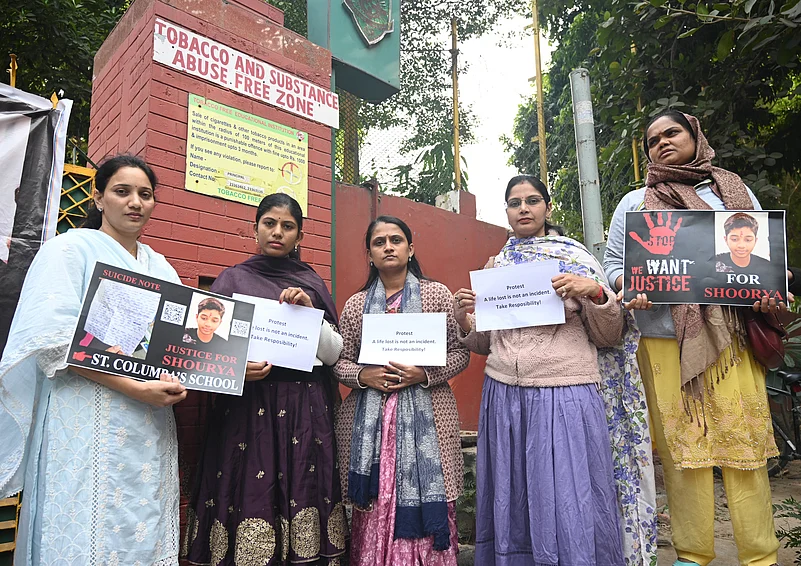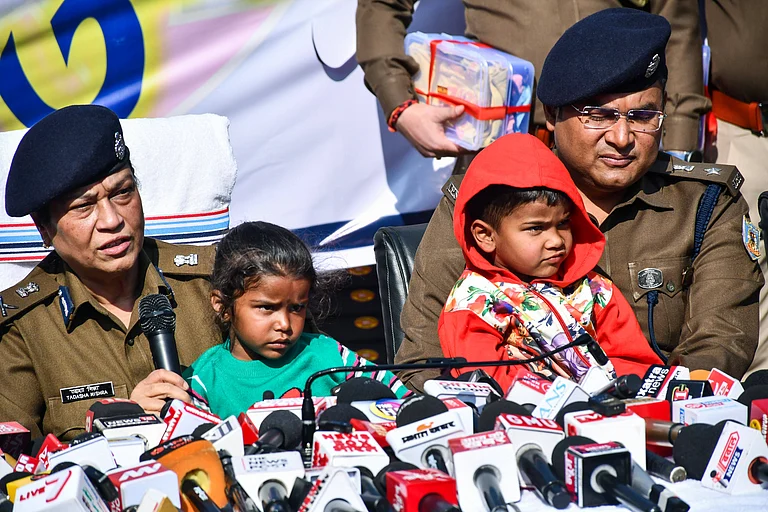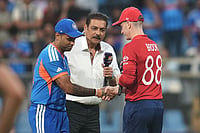
Summary of this article
Three suicides linked to alleged teacher bullying highlight how children’s distress is routinely dismissed as “teenage moodiness”, allowing trauma to deepen.
Experts stress that signs such as avoiding school, unexplained physical pain, and withdrawal from beloved activities often indicate underlying mental-health issues that families and teachers frequently overlook.
Parents’ attitudes range from denial to deep empathy, revealing a fractured understanding of depression, while inconsistent school responses — from mental-health surveys to unchecked abusive behaviour — leave children vulnerable.
‘Meri last wish hai ki inke uper action le, me nahi chata koi aur bacha meri tarah kuch kare’
‘It is my last wish that there is action against these people, I don’t want any other child to do what I am doing,’ these are reportedly the dying words of a young boy who died by suicide in Delhi on November 20th, allegedly due to harassment and bullying by teachers. He also wished for his organs to be donated after his death. He was a student of 10th standard and 16 years old. He had aspired to become the next Shah Rukh Khan.
It hadn’t been even 24 full hours since he died in the national capital when another student, hundreds of kilometres away in Rewa, Madhya Pradesh, ended her life on November 21 after suffering through alleged torture by teachers. She was just 17. Standing on that tender precipice between teenage and adulthood. A line she will never cross now.
Another boy, 14, ended his life earlier this month after allegedly being beaten up by a schoolteacher in Rajasthan. In his suicide note, he demanded jail time for the accused teacher.
The knee-jerk reaction to these numbers would be disbelief, shortly followed by indignation and cries of ‘what worry can a child have? They have seen nothing yet. Do they know how bad life can actually be?’ Even as I spoke to dozens of parents in the aftermath of this news, to see how they feel about it, many claimed that children don’t really have any reason to be that sad about anything that they should end their lives.
They don’t have to pay rent, worry about providing for or raising kids, they don’t know about wars and genocides, or divorce and toxic bosses or terrible in-laws – what problem can they have that is so big that life needs to end?
Turns out, there could be many. As mentioned in the above two cases, it was alleged to be teachers’ bullying and harassment. But according to Dr Jateen Ukrani, a psychiatrist practising in Delhi and Gurgaon, mental health crises among children and young adults are often ignored, misunderstood, or simply disregarded by parents or teachers and given the name of ‘teen angst’.
It is true that teenage years are tricky; many young adults start behaving differently after puberty. And why wouldn’t they? Their body is going through major transitions; hormones are surging through their veins, and they often do not understand their physical and neural metamorphosis for what it truly is. It is a physically painful period as well as emotional. Some can present it with angst, annoyance, and disregard for any parental figure. Boys and girls can become rather moody and go through their rebellious phase.
And amid this violent physiological and behavioral maelstrom, key signifiers of a mental health crisis can be missed.
‘Not wanting to go to school is a big clue,’ says Dr Ukrani. But, don’t all children love to skip schools? I remember heavy rain days being my favourite because school would be shut that day; same with extreme fogs. However, this is a little different than a kid enjoying a free holiday. A child getting severely agitated even at the thought of school or regularly begging to avoid school signifies a crisis. It can be either a sign of depression, some form of mental stress. Or more worryingly, it can mean the child sees the school as a place of torture. Of trauma.
In both the cases cited above, the children were allegedly going through severe trauma at the hands of their teachers. While the parents of the 17-year-old girl claim she was perfectly normal at home, it was different with the 16-year-old boy, who daydreamed of becoming Shah Rukh Khan. His parents told the media the boy had begged them to change schools. He had often complained of being regularly humiliated by his teachers and shared that he does not want to go to this school. The boy – fond of dancing, dramatics, MUN conferences – was allegedly targeted by a group of teachers who saw no value in him. The breaking point came when a teacher humiliated the victim publicly because he had slipped and fallen.
Days later, he ended his life.
The now distressed parents had promised him that there would be a change in schools after the 10th exams. A test he will never give now.
“A child’s brain is still developing, the emotions get heightened to extreme levels, and something an adult like us would shrug off as a bad moment may seem like the end of life to a kid. Yes, many kids would also get over the bad moment, but if someone has an underlying mental health crisis like depression, it would feel like the world has ended,” explains Dr Ukrani.
So, are the teachers to blame? In our culture, we are taught from childhood that teachers or gurus hold as much value as Gods. We are also taught that there is no such thing as depression or anxiety, and these are fads fuelled by social media.
“How can a child know what depression is? It seems to me the parents might be hiding something; no child would kill himself over a little scolding,” says the mother of a 16-year-old girl in Bihar. Almost none of the parents wanted to publish their names, so the names have been kept private. Another mother thinks parents are partially to blame for things. “I have a right to hit my child as a mother. I don’t mean violent hitting, but slaps and all, once in a while to keep him disciplined; otherwise, children will go astray. It is kids who are overpampered by their parents, coddled way too much, who become weak and explode at the tiniest shout or disciplining tactics by teachers,” Says Mrs K, mother to a 14-year-old boy in Mumbai.
On the opposite end of this Maharashtra capital lies Prayaraj in Uttar Pradesh, which was once known as Allahabad. Somewhere in the city of Sangam, a 15-year-old girl defends a teacher’s right to hit students. “These boys in our city are goondas. They will kill one another if not for beatings and discipline by teachers. There is no other way, a child has to be hit here. The city is such,” she argues. When I ask her if anyone she knows was feeling badly about being hit or traumatised by teacher’s bullying, wouldn’t they feel depression? The phone chirps a little with her little teen chuckle. “Kya bol rahe ho, humare yahan nahin hota depression aur ye sab,” (What are you talking about, we don’t have the concept of depression here). When her mother takes over the conversation, she tells me how her depression is not a concept in her house but there was a time when her daughter was ‘scared’. “She changed schools from a girls’ only to a co-ed. These boys were bullies, the teachers helpless, and she refused to go anymore. She kept asking us to change the school. We were strict about not changing schools; we had already paid the fee. So slowly, we taught her how to adjust with these conditions. Now she stays quiet and keeps to her business so there is no issue anymore. Maybe that child’s parents should have done the same.”
Back in Mumbai, another mother is furious when I ask her if she feels the same. “Are these people so selfish? How can anything be more important than a child’s life? So he would take a break year. My child, if she gets bullied by a teacher, that school will face my fury,” says Kanchan Singh, mother of two daughters, a 19-year-old and a 12-year-old. She was also flabbergasted at the thought of other parents blaming children for being ‘weak’. “We are housewives, most of us. Lord knows how much we suffer, what our husbands and in-laws and this society does to us. We who suffer so much must be empathetic to that child who underwent so much trauma. Taking one’s life… imagine how all limits had been crossed for him,” her voice quivers a little at the last thought. She adds how she has ensured her home is a safe space for the two girls and there is nothing they could not share with her, unlike the other three mothers who simply rejected something like depression could ever happen to their kids. Their answers boiled down to the fact that they don’t let their children think that depression is a thing, and all issues they have are rebellions associated with teen years.
Dr Ukrani mirrors this sentiment of having safe spaces. “I have a 9-year-old patient who is now diagnosed with depression brought on by early ADHD. Her parents took her to a jhaad phoonk pandit or a faith healer. They believed her behaviour change was brought on by a possession. Surprisingly, the tantrik or pandit or whatever he was told them this is a case for medical professionals and not tona-totka.”
According to him, mental crises in children are extremely difficult to identify, for the parents. So he suggests that any parent with teen children should look out for three main factors.
avoiding food - not eating or refusing to eat, leading to clashes at home.
persistent pain in the stomach or other areas which have no physiological issue. “Children don’t have the ability to identity something is going on in their head so their bodies repond with somatic symtopms,” he says.
distancing from activities they loved. It is possible they simply outgrow the habit, like abandoning dolls as one grows older. However, things such as hobby classes or sports the child once fought for and now seem like burden to them could be a signal for underlying issues.
If all three or any two are chronically present, he suggests a child should be referred to a doctor.
While he doesn’t agree that a generational shift is to be blamed for this apparent rise in teenage depression, he does agree he has seen many referrals by schools in the recent years. “I get referrals from schools. When teachers see signs of self-harm, cutting, sudden weight loss and general disinterest in life of the student, they call us. I recently had a girl who wrote a suicide note and was ready to end it all. The school found the note, alerted the parents, then us. Now with consistent therapy and medication, we have stablised her and she is adjusting very well with her peers,” he says.
Despite the premise of the cases mentioned being bullying by teachers, many parents refuse to blame them. ‘A teacher has to walk on eggshells these days. This social media generation is so quick to react, would you kill yourself if someone scolded you?” says the Allahabad mom.
Another mom in Navi Mumbai, with a 7-year-old daughter and 15-year-old son says parents and teachers need to change their outlook and adjust with the times. “My husband had a gen-z training at his bank. The session explained that gen-z is thankless and has no empathy. They don’t care about anyone. So we have to assume whatever good we do for them, they will never appreciate it,” she says. Though I move onto the next question with her, it is factually incorrect that Gen-Z care about nothing except themselves. If anything, due to social media, they are extremely informed on the issues plaguing the world at large. So many movements are held on the strong shoulders of this young demographic. To go by the assumption that the teacher will always be right and student always wrong does little to nothing to address the larger issue.
On a Friday evening in Delhi, undeterred by smog or the late November chill in the air, children of various ages play in a park of a gated society in posh South Delhi. A boy of 15 likes the pen I am using to write down their quotes. It is a simple Rs 10 ball point pen, he says this pen gives him the best handwriting.
I ask him about school and he says he loves it. It is a chain, and his branch is in South Delhi. The monthly fee for this 9th standard kid is roughly Rs 22,000 (2,64,000 a year). Teachers never raise a hand at anyone, he has never heard it in stories. Yes, some teachers are ‘khadoos’, he says, meaning not pleasant, but they are very limited. At this posh school, they had a mental health survey in August where children filled out forms anonymously, and these forms had questions to evaluate their mental stress and ‘happiness’. The averages revealed in these forms stated:
More than half of the kids were ‘unhappy’
Of these, the majority were unhappy due to academic stress.
Nearly 40 percent of the ‘unhappy’ felt this way due to bitter relations in the family – parents who fight too much among themselves or were unwelcoming to their children’s ideas and opinions.
He says he is happy though and does not believe depression is real, his mom says it is a social media thing. When asked how he would react if his friend was depressed, he said he would be supportive. “Mere liye asli nahin hai, ho sakta hai uske dimaag me asli ho,” (it isn’t real for me but for him it could).
Another boy, roughly two years older than the 9th standard boy, just laughs. He says of course they get stressed out, but apart from the kid who ‘went crazy’ (in his words), the rest of the school boys are fine.
Children just have to face it, says another. Then they resume their badminton doubles.
Coming back to teachers and children’s mental health, a cricket coach from a Mumbai school is a bully. Everyone says so. The kids as well as their parents. On a cricket tour to Vadodara, his team lost the final despite playing quite well. So at this moment, the coach decided to add new words to the young athletes’ vocabulary by screaming the choicest abuses at them but there was one small issue. This was being live broadcast to the parents. Horrified, they registered their complaints to the schools. One boy ended up crying loudly right there on the field, and any boys were then seen hugging each other and wiping off tears.
The coach is still there. At the posh Navi Mumbai school. He is too good a coach to let go, and the trauma and distress he is causing to the little kids is worth it. Till someone becomes too depressed and needs help, even then that kid would be called a weakling, one of the athlete’s mother tells me.
In that young cricketer’s building lives another 8-year-old girl. ‘‘Teachers hai toh maarte hi hain, hum log kya kar sakte hain,” (yes teachers hit us what can we do? The girl is sad on the video call, but lights up when she says next year, she will be in the new school building and maybe the teachers there would not hit her or her friends or verbally abuse them. Her mother resigns, they cannot do anything, if the school allows beatings that’s it.
Dr Ukrani notes how childhood depression can stem from anything and last a lifetime. An issue which seems trivial to a grown, functional brain can be final nail in the coffin for a depressed teen whose brain is still developing. The only way them out is by listening. If a child is begging for help, as two of the boys who died by suicide had reached out, it should not be ignored. It is extremely difficult to ask for help. And if, despite taking that courageous step, help is denied, it would break the child in all ways imaginable.























